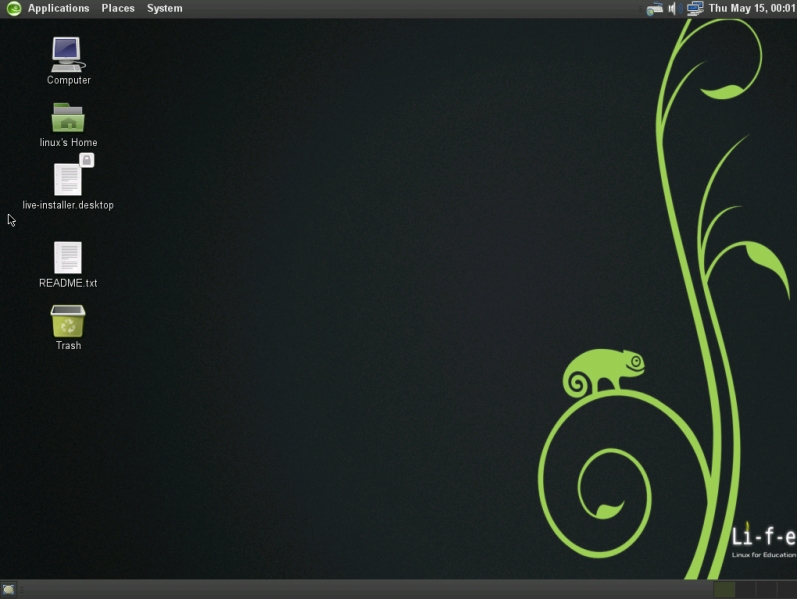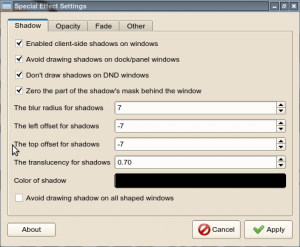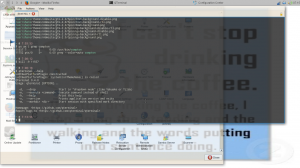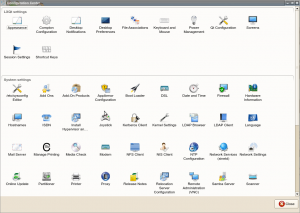Couple of days back went to a school here to demonstrate what openSUSE Education Li-f-e with KIWI-LTSP can bring to their lab. We have created a product based on Li-f-e called My sCool Server. It brings together all the goodies that a modern operating system must have and all the softwares required by the state board curriculum in one seamless package.
(more…)
Archive for May, 2014
Tiny Core kiwi-ltsp thin client
May 31st, 2014 by Jigish GohilHave some fun… patch your kernel
May 28th, 2014 by Tuukka PasanenOn this point you should have compiled your own Linux kernel. Get it up and running with your hardware but what’s the catch with all of this? Why on earth I want to have this much trouble with my operating system when I can write highly popular fiction with DOS and Wordstar? (more…)
Gnome Classic edition of openSUSE-Education
May 23rd, 2014 by Jigish GohilHere is more goodness from openSUSE Education team, get openSUSE Edu Li-f-e in Gnome Classic flavor.
openSUSE Edu Li-f-e MATE
May 19th, 2014 by Jigish GohilThe openSUSE-Education team is proud to present a special, 64-bit edition of openSUSE Edu Li-f-e with the MATE desktop environment.

LXQT is ready for testing
May 15th, 2014 by sfalkenThe stable branch of LXQT, the QT branch of LXDE is now available for openSUSE:13.1 and openSUSE:Factory.
Following are a few screenshots of lxqt, which will be quite familiar to any of you that dabbled with Razor-qt in the past.
Here is the Main Desktop (note, this is using the “flat” theme, and the default openbox windowmanager)

LXQT can offer a fully composited desktop, through the compton compositor, and includes a GUI tool for configuring.

Resulting in a highly configurable composited desktop:

LXQT also provides a powerful configuration tool, which allows you to tweak things the way you like…

So if you’re looking for something to try out, please, give it a shot.
Please keep in mind, we are considering this a “Beta” quality release, so there are still some rough edges.
Additionally, lxqt is currently un-branded for openSUSE, so I certainly wouldn’t turn down help from folks that are into helping out with that sort of thing.
Stable packages are available for openSUSE:13.1(i586, x86_64, armv6l and armv7l) and openSUSE:Factory (i586 and x86_64) at:
X11:lxde:lxqt
Unstable Packages (latest git pulls), are available for 13.1 and Factory, i586 at:
devel:cloverleaf:lxqt:UNSTABLE
And if you happen to be running Fedora, i586 and x86_64 packages are available at:
devel:cloverleaf:lxqt:fedora
Web frontend to change ldap password
May 12th, 2014 by Jigish GohilWeb frontend to change ldap password, based on http://ilya-evseev.narod.ru/posix/webldappasswd/
Minor changes to make it work with SUSE ldap server.
To deploy do these steps on ldap server:
cd /srv/www/htdocs
git clone git@github.com:cyberorg/webldappasswd.git
cp ldap.php-sample ldap.php
Change the text in bold below to point to your correct ldap domain in ldap.php
$ldapFullUsername = “uid=$userLogin,ou=people,dc=digitalairlines,dc=com“;
You of course need, web server running with PHP support and ldappasswd (openldap2-client package) installed.
A Brief Report on oSC ’14
May 11th, 2014 by sfalkenSo yes, I attended oSC 14, gave a talk, attended some others, ate some food, didn’t drink nearly as much beer as I thought I would. Which can be good, or bad, depending on your perspective…..
My GF and I (who incidentally, while quite a bright girl, and a programmer of sorts, knows pretty much nothing about openSUSE, or linux in general….) arrived into Dubrovnik on Thursday, about 1600 local time, got checked into the hotel, which incidentally was rather nice, if you’re in the mood for visiting Dubrovnik someday, the Rixos Libertas is good stuff.
We headed down to the meet and greet, unfortunately, we were a bit late, so we missed out on the refreshments, but things went well enough, for never having met any of the folks there.
The next morning, we managed to get moving late, and miss the keynote, which I’m sure was quite good. The 11:30 session I wanted to attend was cancelled (and I can’t recall what it was, as it is removed from the schedule), so we walked down into town to grab some lunch. Unfortunately, we chose poorly. The food was excellent, but the service a bit slow, so we missed the first part of the mysql talk after lunch. What we did catch was quite good, and certainly gave me some ideas for hardening mysql installations, the next time I need to put one together.
The next session we went to was the Design and Branding session, which was certainly enlightening, seeing some of the new logo ideas, and how “official” colours and fonts are selected. We then attended the Suse Linux Enterprise and openSUSE session. It was a bit enlightening, getting a little better idea of how SLE and openSUSE interact, I wouldn’t say I’m “clear” on everything, but I have a better idea. The YaST devel collaboration session was next, which honestly, was a bit over my head, but to be fair, I didn’t look at the summary quite closely enough. The last session we attended that day was the Spec-cleaner session, which was really good. I’ve been using the heck out of it since I got back, getting my spec files nice and clean, and conforming a bit better to design guidelines.
On Saturday, we got up and moving on time, had some breakfast at the hotel, and then headed to the conference, and caught Jos Poortvliet’s presentation on KDE, which gave a nice overview on where KDE is headed with Frameworks 5. After lunch we attended the Ruby on Rails workshop, and while I wasn’t able to really do the workshop due to some network issues (mainly, I couldn’t get the appropriate stuff installed during the workshop), but since getting home, I’ve worked through it, and while I certainly don’t consider myself fluent in ruby on rails now, I certainly do know how to get a project started, and feel comfortable bashing around in there to sort things out.
My talk on Bodega was after the mid-day break, and fairly well attended, and luckily Jos was there to save my arse on a few points I’d forgotten to put in my presentation. I think it went fairly well there, especially considering I don’t have any code committed yet.
The last session we attended Friday was the Btrfs, LVM, and Snapper session, where I picked up a better understanding of how to work with snapper and btrfs. That night, we hooked up with Jos and coolo, and a couple other guys (who’s names I don’t remember, sorry), and spent a bit wandering around, looking for a place to get some dinner, which did seem to take an absurdly long time. But the food was good, although my feet certainly were tired by the time we got back to the hotel.
Sunday morning, my girlfriend was feeling a bit under the weather, so the only sessions I actually attended were the 1130 openSUSE community meeting, where I got a little better idea of who makes up the community, and some other things, perhaps that I misunderstood about how the community works, and the Afternoon openQA session, where I got an excellent workshop on how to write openQA tests. I haven’t had much chance to mess with it since I got home, but I certainly will be using it.
Monday, I attended Robert’s KIWI presentation, where things were a bit hampered, due to either folks not having capable hardware, or having network issues (me), so nobody got to really do the workshop. But once again, now that I’ve gotten home, I’ve been able to work through Roberts workshop, and if you’re interested in using Kiwi, I *highly* recommend getting a copy of it, and going through it.
And that concludes my trip to Dubrovnik, other than a very long and uncomfortable flight back to the states.
Echoes from oSC’14: state of Factory and openQA
May 8th, 2014 by calumma
There has a been a lot of work going on regarding the stabilization of Factory. It is still ongoing process. We have a lot of submissions, Factory is moving really fast and was hard to keep stable. Over the time, there were more and more checks added to the process to make Factory more stable and usable in everyday life. Last of them being added right now are rings and openQA. You can learn more about that in the talk by our release manager coolo. It will also allow you a quick peek behind the curtain on what future will bring.
In that future, one of the core roles in making Factory stable will be played by openQA. As such it got quite some attention during openSUSE Conference 2014 in Dubrovnik. Stable Factory will not happen by itself, it need quite some work. Currently openQA is under heavy development to match the new needs. You can help improving it! The work is being coordinated in a progress.o.o project, the sources are available in a Github’s organization and there is even a talk to introduce you to the world of openQA development 😉
At some point, when openQA gets integrated well enough, users will be able to enjoy “almost” bug free Factory as a rolling distro. How bugfree it will be will depend on our test coverage of the distribution. What is the current state? We have basics pretty well covered, but still sometimes existing tests break and sometimes we miss more tests. If you want to help with making Factory better tested, you can get openQA running locally and start writing tests for stuff that matters to you! During a nice workshop in openSUSE Conference, Ludwig Nussel trained some geekos on how to get a local openQA running and start writing tests. Luckily, workshop was recorded so even if you missed the conference, you can watch it and start writing tests. New tests are welcome, although due to performance reasons (we want openQA to finish at some point, right?), not everything might get run every time. Even though, you can always run your own openQA instance for testing stuff that you care about and reporting to bugzilla!
Looks like there is a bright future in front of us with stable well tested Factory continually rolling forward. There is plenty of work to be done to achieve this, but progress made so far is starting to show results and we will approach the final goal faster as we get more people involved.
Proprietary AMD/ATI Catalyst fglrx 14.4 (14.10.1006-1) rpm released
May 2nd, 2014 by Bruno FriedmannAs of May 2nd, a bunch of new rpm for FGLRX has been released for openSUSE 11.4 to 13.1 including Tumbleweed
Notice
This release concern only owners of radeon HD5xxx or above.
For older gpu, the fglrx-legacy is still 13.1, and thus didn’t work with openSUSE 12.3 or above.
SDB:AMD_fgrlx_legacy
Beware of that, and prefer the free open-source radeon driver which came out of the box from your openSUSE distribution.
For 12.3 and especially 13.1 the free radeon often offer a better experience than the old fglrx-legacy, especially for HD2xxx-HD4xxx range.
Help for spreading the word
Dear fellow I’m counting on you to spread the word, in the different social media you’re subscribed, and also on Mailing list, forums.
Feel free also to translate it into your native language
Release note about 14.4
New Features:
The following section provides a summary of new features in this driver version.
Support for the AMD Radeon R9 295X Ubuntu 12.04.4 support Full support for OpenGL 4.4 OpenGL 4.4 supports the following extensions: ARB_buffer_storage ARB_enhanced_layouts ARB_query_buffer_object ARB_clear_texture ARB_texture_mirror_clamp_to_edge ARB_texture_stencil8 ARB_vertex_type_10f_11f_11f_rev ARB_multi_bind ARB_bindless_texture ARB_spare_texture ARB_seamless_cubemap_per_texture ARB_indirect_parameters ARB_shader_group_vote
Resolved Issues:
This section provides information on resolved known issues in this release of the AMD Catalyst Linux Software Suite.
Corruption and system hang observed while running Sanctuary BM with Tear Free Desktop enabled
Memory leak about hardware context
EGL create context error for glesx
GPU hand in CrossFire Mode
[Piglit] Test "spec/arb_vertex_array_object" failed
[Piglit] Test "glx/GLX_EXT_import_context/free context" failed
[Piglit] Test "spec/ARB_seamless_cube_map" failed
Piglit] Test "texture swizzle with border color" failed
Glxtest failures observed in log file
Blank screen observed while running steam games with Big picture
4ms delay observed in the glxSwapBuffers when vsync is enabled
RBDoom3BFG the game auto quit when use the security camera terminal
ETQW segmentation fault
Known Issues:
The following section provides a summary of open issues that may be experienced with the AMD Catalyst Linux Software Suite.
Performance on some Steam OS games is lower on 1GB graphics memory cards, compared with 2GB graphics memory cards Some Piglit tests cause a system hang under Ubuntu
This Catalyst fglrx version support openSUSE version from 11.4 to 13.1 plus Tumbleweed (thus covering kernel from 3.11 to 3.14 series).
A special thanks to Sebastian Siebert for his effort on making this driver working under openSUSE and latest kernel.
If a kind German geeko can take the time to translate his article, put the result in comments below, you will understand that getting it working,
is not just Fun.